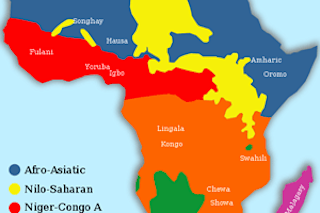Most readers at this point are aware that I am very curious as to the origin of Europeans at the interface of hunter-gatherer populations and Neolithic farmers. What we thought we knew around the year 2000 does not seem to align very well with the conflicting results coming out of recent analyses. There is no ascendant consensus at this point. All possibilities are still in the field of play. Part of the issue of course is that the spread of farming in Europe was a prehistoric affair, very far back in time. There have been several cultural, and possibly demographic, revolutions in Europe since the arrival of the first farmers. Pulling apart the manifold layers of the palimpsest is a task of great difficulty, and the confident results utilizing the tools of the past should make us cautious of the inferences of the present. This is why I believe focusing ...
Sons of the farmers, the origins of Africans
Explore the Bantu expansion and its impact on Africa's genetic diversity and hunter-gatherer populations.
More on Discover
Stay Curious
SubscribeTo The Magazine
Save up to 40% off the cover price when you subscribe to Discover magazine.
Subscribe













